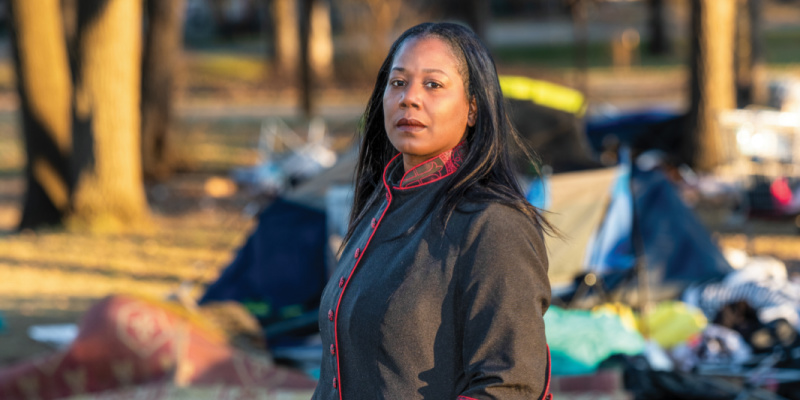By Hannah Wente | Photography by Shalicia Johnson
Mattie Reese wants everyone in Madison to see the people experiencing homelessness and do their part to help through policy change, resources and innovative solutions.
“We’ve always known about the homeless population in Madison, but it was swept under the rug,” she says. “COVID brought to light that no matter your housing status or your color — it [could impact you]. It showed us we need to pull together to make Madison equal for everyone.”
In 2020, she formed the grassroots nonprofit organization Connecting the Dots with Mattie Inc. to respond to community needs during the pandemic. The nonprofit provides daily resources and case management to people who are economically insecure and experiencing homelessness.
Reese, a community organizer since 1992 and Madison College graduate, also saw a need to give a voice to a population disproportionately affected by the pandemic.
“Everybody had someone representing them,” she says. “Black Lives Matter had someone representing them — my community had folks representing them — but [the homeless] population had no voice. It was in my heart — I wanted to give them a voice, and to help Madison recognize our homeless population was hurting more than anyone.”
At her church and on her own, she cooks, packages and transports meals all over the city to those who are experiencing homelessness. She has distributed care kits with toothbrushes, toilet paper, soap and other necessities to people in need throughout the pandemic at homeless encampments at city parks like McPike and Reindahl.
A homeless encampment was never sanctioned in McPike Park, but many people experiencing homelessness camped there starting in 2020 through February 2021. In March 2021, the city ordered that McPike Park be cleared out, and some people were moved to Reindahl Park. In May 2021, Reese helped move some people from Reindahl Park into hotels. (The city ordered Reindahl Park to be vacated in December 2021.)
“If you give them an opportunity to get a fresh start, and in their mind they’re ready, man, they clean up well,” Reese says. “Many want to clean up but they don’t have the space, or the opportunity, the necessity to do it. Getting them out of that park and into a hotel showed me they could bounce back and become part of our community.”
City officials continue to work on more permanent solutions for those experiencing homelessness. They’ve helped relocate many to women’s and men’s shelters, to hotels and with family members. Two tiny home villages run by Occupy Madison, for those experiencing homelessness, are also up and running — the newest one on Dairy Drive.
DREAMING BIG
In December 2021, Reese’s nonprofit was awarded a $150,000 Dane County grant for case management and purchasing necessities for those experiencing homelessness.
She’s already in talks for a lease for a kitchen on the East Side that would provide meals to those experiencing homelessness. And in 2022, she hopes to launch a transitional housing project in Stoughton. She notes the surburban location is purposeful, because many of the people she serves want to work, but struggle with drug use or violence based on the circumstances and people around them — most notably in the East Washington corridor.
“Removing them from that environment gives them the tools to adjust [to a new way of life],” she says. “If we can get them into [a new] area, get them stable and find them employment in that area, they’ll become part of that community,” she says.
In the long run, she wants to provide assistance to those who fall through the cracks of Madison’s current nonprofit- based homeless services — which primarily falls on the shoulders of The Beacon, a homeless day resource center.
“What I wish Madison would do is not just depend on one organization to handle the whole city — it’s impossible,” she says. “I learned that if you’re not under an association’s name or you’re not in their group, you don’t receive their assistance — that’s the hugest barrier I wanted to break.”
She’s also intending on making connections within the business and nonprofit communities, and finding additional funding, staff and volunteers to help her do paperwork and write grant applications.
“I thought I was superwoman,” she says. “I thought I could save this population no matter what. What I’m learning is that you need partners.”

